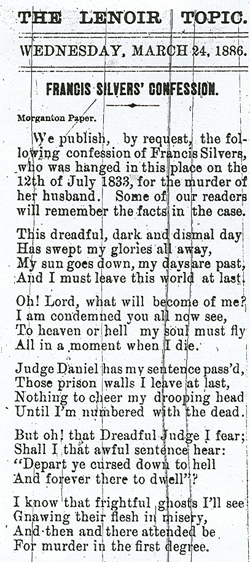d. 12 July 1833
See also: Silver, Frankie, Murder Case; Silver, Francis "Frankie"

Frances [Frankie] Silver, who was tried, convicted, and executed for the murder of her husband, Charles, was the first woman to be hanged in North Carolina. Official records of Burke County Superior Court also show her given name as Frankey and Frankie and her surname as Silvers. Whereas court records report her maiden name as Stuart, other sources use Stewart. Her parents were Isaiah and Barbara Stuart.
Frankie Silver was executed for committing one of the most brutal murders in the history of North Carolina. In the presence of her year-old daughter, Nancy, she decapitated her husband and burned his remains in the fireplace of their home near the present community of Kona in Mitchell (then Burke) County. She attempted to conceal her deed by reporting that Charles was lost on a hunting trip. When search parties failed to find any trace of him, a more intense search was conducted in and around the Silvers' home. Jack Collis, a neighbor, noticed pieces of bone in the fireplace ashes; he also commented that the ashes were very greasy. Other evidence was found in the house to suggest that Frankie had killed Charles, and she was arrested on 10 Jan. 1832.
On 30 Mar. 1832, after two days of testimony at her trial in Morganton, she was found guilty and sentenced to be executed at the June session of court the same year. An appeal to the state supreme court was heard during the summer and denied. The case was sent back to the Burke County Superior Court so that a new execution date could be set. For some unknown reason the judge failed to appear in September, and court was adjourned until March 1833.
One year after her trial, Frankie's execution date was set for 28 June 1833. By this time she had been confined for fourteen months. With the aid of her father and uncle, ten days before her scheduled appointment with the hangman, Frankie Silver escaped from jail. Within hours, however, she was found and returned to custody. Again, the execution was inexplicably delayed but finally reset and actually carried out on 12 July 1833.
Numerous legends, romantic stories, and songs have evolved out of the few facts known of these events. No reason for the murder was ever given during the trial, and most of the evidence against the defendant was circumstantial. She never made a public confession of the crime. Legend reports that she sang a self-composed song on the scaffold in which she confessed. Eyewitness reports, however, contradict this claim. Many said that Charles Silver had badly mistreated his wife, but under the laws of the time she was prohibited from testifying against him.
Frankie was buried by her father approximately nine miles west of Morganton. It is interesting to note that other members of the Stuart family met violent deaths. Isaiah was killed when a limb from a tree he was cutting hit him on the head; Barbara died from a snakebite; and one of Frankie's brothers, Blackston, was hanged for stealing a horse in Kentucky.